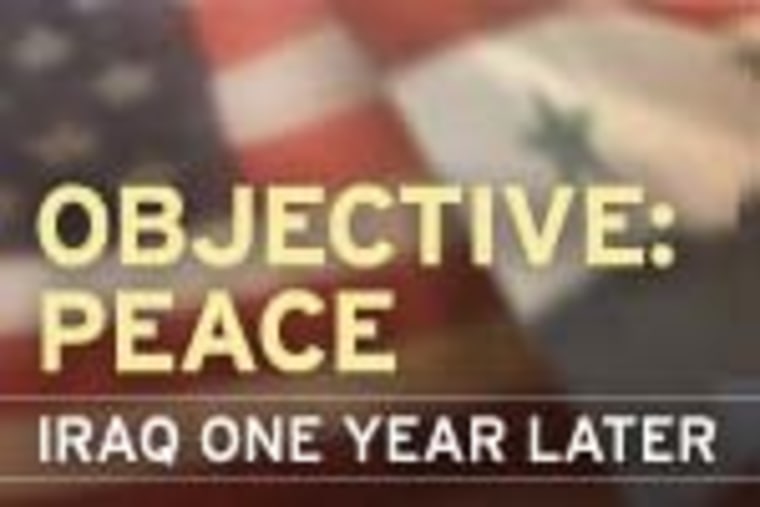On the eve of the Iraq war anniversary, President Bush traveled to this military base Thursday to personally thank some 20,000 servicemen and women who served there.
Welcomed to chants of "USA! USA!," the president praised the troops for serving during "a crucial hour in the history of freedom," especially those who just returned from abroad. "Thank you for the job well done, welcome home," he said to cheers.
The president has faced criticism about the evidence used to justify the war in Iraq, but he emphasized Thursday that Congress and the U.N. Security Council had concurred with him about the evidence against Saddam Hussein. "Faced with that choice, I will defend America every time," he told the soldiers gathered at an outdoor field.
After his remarks to the troops, Bush and first lady Laura Bush had lunch with the soldiers. After the pep talk, Bush met privately with 133 survivors of 46 who never made it home.
He later walked the chow line with his wife, Laura, and with soldiers, picking out fried shrimp, corn and broccoli. Bush passed on the prime rib, but marveled at one soldier’s slab of beef: “Whose steak is that? That’s half a cow!”
Scores of soldiers sat ramrod-straight as Bush then entered the mess hall. The president bowed his head with them for a prayer, then dug in.
Rank-and-file views
Interviews with troops here suggested that Bush retains the strong support of the rank and file in the military, although many have lost comrades in Iraq.
Fort Campbell has the third-largest military population in the Army. It also has lost the most soldiers in the Iraq campaign: Of the 567 U.S. service members who have died in Iraq, 60 have been from Fort Campbell. The base also lost 14 men in Afghanistan. Hundreds have been injured in both countries.
“It’s about time we got somebody in a key position to do what we need to do” in leading the military, said Sgt. Jerry Tucker, who served in Iraq.
But Staff Sgt. Jon Meyer said he wanted to hear Bush say he would send more troops to Iraq to bolster the current force. Soldiers in Iraq felt short-handed “any time you went into a village or city,” Meyer said.
Many soldiers here are still grieving for fallen friends.
“When my buddy died, it was the saddest day of my life,” said Spc. Brian Belue. “But I know he died for a great cause and I know he was proud to give his life for his country.”
Politics of war
The trip Thursday was part of Bush’s campaign to persuade Americans to give him another four years as commander in chief, at a time when military leadership occupies center stage in the presidential campaign. Karl Rove, Bush’s chief political strategist, accompanied him here, pacing and talking on a mobile phone outside the building where the president met with survivors.

Democratic Sen. John Kerry accuses Bush of leaving American troops vulnerable in Iraq, while Bush and Vice President Dick Cheney argue that Kerry lacks the judgment to lead the armed forces.
Bush last visited Fort Campbell on Nov. 21, 2001, about two months after the terrorist attacks in New York and Washington. Then, Bush’s aim was to rally the troops. On Thursday, the eve of the one-year anniversary of the U.S.-led invasion of Iraq, his intention was to give thanks and to place his political strong suit — national security — on full display.
By a 2-to-1 margin, polls show that voters approve of the way Bush is handling terrorism. However, those surveys suggest the public remains divided about the Iraq war.
Vice president weighs in
Bush and Kerry are both working hard to try to polish their military-leadership credentials, and raise questions about each other’s fitness to be commander in chief.
Vice President Dick Cheney, speaking Wednesday in California, praised Bush’s victories in the war on terror and portrayed his boss as a strong, decisive leader — characteristics required for a wartime president and ones, he argued, that Kerry lacks.
Cheney devoted much of his speech to criticizing the Massachusetts senator, citing Kerry’s votes against weapons and defense spending, and his opposing stands on Iraq.
Kerry opposed the 1991 Persian Gulf War to oust Iraq from Kuwait but supported giving Bush congressional authorization for the current U.S. campaign in Iraq.
“Whatever the explanation ... it is not an impressive record for someone who aspires to become commander in chief in this time of testing for our country,” Cheney said. “Senator Kerry has been one vote of 100 in the United States Senate and fortunately, on matters of national security, he was very often in the minority.”
Kerry challenges Iraq policy
Flanked by defense officials and diplomats from the Clinton administration, Kerry delivered a broadside to Bush’s strategy for Iraq, focusing on the unending hostilities, alienated allies and the loss of lives.
As the presumptive Democratic presidential nominee spoke in Washington, a deadly explosion at a Baghdad hotel served as a stark reminder of the perils in postwar Iraq.
“Today we know that the mission is not finished, hostilities have not ended, and our men and women in uniform fight on almost alone with the target squarely on their backs,” Kerry said. “Every day they face danger and death from suicide bombers, roadside bombers, and now, ironically, from the very Iraqi police they are training.”